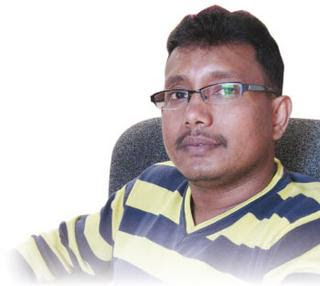22 February 2008
It does take two, you know

Kimmy Kiew
Kimmy Kiew explores the relationship between two married individuals about to get it on for a night, writes MAX KOH
KIMMY Kiew knows a thing or two about directing a play in various languages. The Ipoh-bred young thespian has directed Chekov’s The Bear in Mandarin, Okiku — A Tragedy Retold in English, and recently Race — Four Original Plays in English and Malay.
So, are you surprised that Kiew is presenting The Bench in Cantonese?
The Bench, a two-character play adapted from the original Alexander Gelman text in Russian, explores the relationship between two married individuals about to have a one-night stand.
The man lusts to fulfil his desire while the woman yearns for true love. Will the rendezvous lead to an exciting affair or expose their own loneliness?
“In the end, the two individuals are forced to dig out the sad things about their lives and marriages. We will see how the characters change throughout the play and also explore the idea of sex equality in contemporary society,” says Kiew.

Tan Heng Leng
She says she first read the play in a book she bought in Beijing some years ago, and stayed intrigued by the premise of the story (a Chinese translation by Kwok Jia Shen).
The Bench is part of Kuala Lumpur Performing Arts Centre’s (KLPac) 2somes, a series of two-character plays directed by three directors exemplifying the best in contemporary two-handers onstage today.
The intimate nature of these plays allows the audience to experience the intense personal conflict between the two protagonists.
Other than The Bench, 2somes also offers The Secret Life Of Ophelia directed by Christopher Ling and A Life In The Theatre directed by Abdul Qahar Aqilah.
Why Cantonese? “Growing up in Ipoh, I’m most comfortable in Chinese. I picked up Cantonese from watching all the television dramas.
“There is a down-to-earth and slightly harsh quality to the Cantonese language which I feel is suitable for this play.”
The two protagonists in The Bench are well-known lighting designer Tan Heng Leng and thespian Ling Tang. Although Tan last appeared on stage in 2001, Kiew feels he is a perfect match for the role.
“We were classmates in college and so we have a history of working together. At first, I was afraid that he might be a bit guarded about his feelings, but he proved me wrong,” says Kiew who graduated from the Malaysian Institute of Art.
Ling Tang, a graduate of China’s prestigious Central Academy of Drama (which also trained Zhang Zi-Yi), was last seen in Loh Kok Man’s Animal Farm.
Kiew feels the language is not barrier to enjoying The Bench. “It’s not important if people don’t understand Cantonese. As long as there is good acting, I believe any audience can follow a story.”
But don’t fret — there’ll be English subtitles.
KLPac’s 2somes kicks off Feb 26 and ends March 8. Showtimes are 2pm, 5.30pm, 8.30pm. Tickets are RM15 and RM25, with discounts. Call 03-40479000 or visit www.klpac.org.






